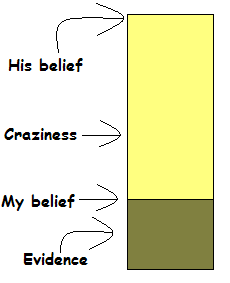Sorry, George Michael
Suppose you're walking down the street in Dallas when you're approached by a guy who looks as if he hasn't shaved or showered in thirty years. 'Kennedy was killed by Alaskan coal miners!' he tells you.
You, being an open-minded person with nothing better to do, ask him how he knows. He proceeds to show you charts and diagrams and reams of print-out supporting his claim. You study the data carefully for a bit and come to the following conclusion: 'It's possible, but very unlikely.' The evidence just isn't that strong. It's weak enough, in fact, that you'd withhold judgement even if it didn't seem an extraordinary claim to you.
'This isn't entirely convincing', you tell the guy. 'Any other evidence?'
'No, this is all I have. But I'm dead certain it's true.'
Now here's the thing: the evidence supports a belief of strength 'possible, but unlikely', so that's the belief you've formed. The evidence is a far cry of supporting a belief of strength 'dead certain', yet that's the belief this guy has formed. There's a huge gap between the evidential support and the guy's certainty. What is it in that gap?
You look at the guy and it immediately becomes clear: craziness.
The next day, you're out for a walk and a guy comes up to you and says 'God exists! Here's proof.' And he shows you the Bible, historical evidence of apparent miracles, claims from seemingly-sane people who say they felt God, and so on.
You study the evidence carefully for a bit and come to the following conclusion: 'It's possible, but very unlikely.' The evidence just isn't that strong. It's weak enough, in fact, that you'd withhold judgement even if it didn't seem an extraordinary claim to you.
'This isn't entirely convincing', you tell the guy. 'Any other evidence?'
'No, this is all I have. But I'm dead certain it's true.'
Same situation as before: the evidence supports a belief of strength 'possible, but unlikely', so that's the belief you've formed. The evidence is a far cry of supporting a belief of strength 'dead certain', yet that's the belief this guy has formed. There's a huge gap between the evidential support and the guy's certainty. What is it in that gap?
You look at the guy and since he's clean-shaven it immediately becomes clear: faith.
Now here's the thing: that's just stupid.
Faith is obviously a synonym for craziness. They both mean 'the non-thing filling in the space between the evidence and the strength of belief.'
